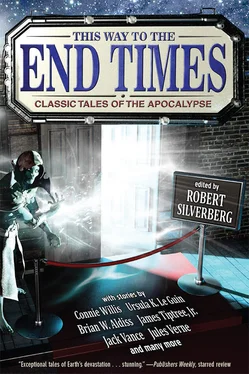And just as we crossed the threshold, the house collapsed in a heap, burying in its ruins Judge Mendoza and my valet Germain, who were slower than the rest. After a few seconds of quite natural shock, we were about to attempt their rescue when we were interrupted by Raleigh, my gardener, who came running up, followed by his wife, from his cottage at the lower end of the garden.
“The sea! The sea!” he was shouting at the top of his lungs.
I turned toward the coast and stood without moving, frozen with stupor. Not that I had any clear grasp of what I was looking at in that twilight haze, my only thought (and it hit me instantly, like a blow) was that the familiar face of things had changed. And my heart was chilled when I realized that a world I had considered essentially immutable had been strangely modified in a minute.
But I was not slow in recovering my presence of mind. Despite our wild boasting of a moment ago, the true superiority of man lies not in dominating or vanquishing nature. Rather, for the reflective man, it lies in comprehending, in containing, the immense universe in the microcosm of his mind. And for the man of action, it lies in preserving a cool head in the presence of rebellious matter, as if to say: “Destroy me if you will! But unnerve me—never!”
As soon as I had collected myself, I understood in what way the scene before my eyes differed from that to which I had grown accustomed. The simple fact was that the cliff had disappeared; my garden had fallen to the level of the sea, and the waves, having destroyed the gardener’s house, were now foaming over my lowest flower-beds.
Since it was scarcely admissible that the water had risen, it followed necessarily that the land had settled. It had fallen more than a hundred meters, the previous height of the cliff; but the descent must have been accomplished with a certain smoothness, for, after the initial jolt, we had hardly noticed it. And yet there was no other way to account for the relative calm of the ocean.
A brief examination convinced me not only that my hypothesis was correct, but that the descent had not stopped. The sea was continuing to gain, in fact, at a rate of perhaps two meters a second, or seven or eight kilometers an hour. As a consequence, given the distance between us and the first waves, if the speed of our descent remained uniform, we were going to be swallowed up in less than three minutes.
My decision had to be quick:
“The auto!” I cried.
Everyone understood. We all ran to the garage, literally dragged out the car, and packed ourselves in without ceremony. Simonat, my chauffeur, slid under the wheel, started the motor, engaged the gears, and headed for the road in fourth speed. Raleigh, who had darted ahead to open the gate, leaped on as we passed and crouched on the rear bumper.
Just in time! When the car turned into the main road, a wave sloshed under us, wetting the wheels up to the axles. But no matter, now we could laugh at the sea’s pursuit! In spite of the excessive load, my automobile would carry us beyond its reach—unless the land should continue to sink indefinitely. In short, we had a clear field before us: two hours, at least, of ascent, and an available altitude of better than fifteen hundred meters.
But I soon realized that we could not yet cry victory. Although the first leap of the car had carried us twenty or so meters beyond the fringe of foam, it was in vain that Simonat opened the throttle wide; our lead did not increase. Of course, the weight of twelve people was slowing the speed of the vehicle. Whatever our speed, it was exactly equaled by that of the invading water, and the distance between us remained constant.
As soon as the others understood our disquieting predicament, they all (except Simonat, who was intent upon managing the car) turned round to watch the road behind. There was nothing but water to be seen. No sooner did we pass over a stretch of road than it would disappear beneath the advancing sea. The water was now smooth; scarcely a ripple rode in to die on a beach that was ever new. It was a tranquil lake that was swelling, always swelling, at a steady rate . . . and nothing was so grim as the pursuit of that tranquil water. It almost seemed useless to flee before it; the water was mounting, implacably with us.
Keeping his eyes fixed on the road, Simonat said as we came to a turning:
“Here we are at the halfway mark. An hour’s climb still ahead.”
We shuddered—and why not! In an hour, we were going to reach the summit, and then we should have to go down again, chased, then overtaken, regardless of our speed, by the masses of water that would tumble over us like an avalanche!
The hour passed with no change in our situation. The crest of the mountain rose just ahead. But then came a violent shock, and the vehicle gave a lurch that almost crashed it against the roadside bank. At the same time, an enormous wave swelled behind us, rushed up the road, rose in a curve and broke against the auto. We were plowing through foam . . . were we at last to be engulfed?
No! The frothing water receded, while the car, with sudden life in its motor, took on renewed speed.
What could explain this unexpected acceleration? A cry from Anna told us: the poor woman had just discovered that her husband was no longer crouching on the rear bumper. Evidently the retreating wave had carried off the unfortunate man and now the car, relieved of two hundred pounds, could make better time on the slope. But suddenly it came to a dead stop.
“What’s the matter?” I asked Simonat. “A breakdown?”
Even in our tragic circumstances, professional pride did not forget its rights; Simonat gave a shrug of disdain, intending me to understand that breakdowns were unknown to chauffeurs of his class. He silently pointed to the road ahead. The reason for our halt was then apparent.
Less than ten meters in front of us, the road was cut off. “Cut” is the right word: you would have supposed it chopped by a giant cleaver. Beyond the sharp edge that abruptly terminated it was a void, a dark abyss, in the depths of which we could distinguish nothing.
We looked behind us, aghast, certain that our last hour had come. The ocean, which had pursued us as far as these heights, would now overtake us in a few seconds.
But, except for the unhappy Anna and her daughters, who were shaken by heartbreaking sobs, we all gave a shout. The water was no longer rising—or, more accurately speaking, the land had stopped sinking. Doubtless the shock that had nearly wrecked us had signified the end of the disturbance. The ocean, therefore, had stopped its advance, and in the gathering darkness we could see that its level stood nearly a hundred meters below where we were grouped about the auto which was still panting like an animal out of breath after a rapid race.
Could we succeed in getting out of this bad spot? We should not know until daylight. Till then we must wait. One after another we stretched out on the ground, and I believe that I fell asleep. . . .
IN THE NIGHT I HAVE been startled out of my sleep by a tremendous noise. What time is it? I do not know. But at least we are still plunged in the darkness of night.
The noise is issuing from the unknown abyss into which the road ahead has fallen. What is going on down there? I judge that masses of water are dashing violently together. Yes, that must be the answer, for the spray is raining on us.
But the quietness is gradually returning . . . complete silence once more. The sky shows a pale light. . . . Day is breaking. . . .
May 25.
WHAT TORTURE WORSE THAN THE slow revelation of our true predicament! A few moments ago we could make out only our immediate environment, but the circle has widened, ever widened, as if in desperation we were drawing aside curtain after curtain. And finally broad daylight destroys our last illusions.
Читать дальше











